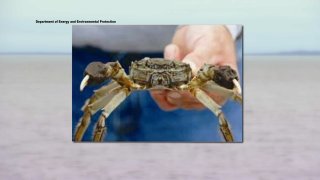
Mitten crabs, an invasive crab species not native to Connecticut, are being monitored by the Department of Energy and Environmental Protection (DEEP). This after several were recently found in the Housatonic River.
DEEP wants people to be on the lookout for this very distinctive-looking crab. It has six thin, spider-like legs and two claws with white tips that look like mittens.
According to the U.S. Department of Agriculture, the mitten crab is native to the pacific coast of China and Korea. However, it has been spotted in Connecticut and the Department of Energy and Environmental Protection is concerned.
“It is a threat,” said DEEP Director of Fisheries Pete Aarrestad.
Get top local stories in Connecticut delivered to you every morning. Sign up for NBC Connecticut's News Headlines newsletter.
The USDA says mitten crabs can interfere with fish salvage operations, fish passage facilities, water treatment plants, power plants, and other facilities. Marine scientist Dick Harris says as the fall sets in, these crabs burrow into riverbanks, making them unstable.
“If you get thousands of crabs burrowing into a bank, they turn the bank into jelly. What happens at that point is structures start to fall into the water,” said Harris.
Harris, who works as an advisor for the Norman Bloom and Son oyster business, says he saw four mitten crabs while dredging for oysters in the Housatonic River last year. This year in the same area near Stratford, he says they found 13. Not a large number, but DEEP is monitoring the volume and migration pattern.
Local
“They will move between habitats,” explained Aarrestad. “In essence (they are) moving between salt water and freshwater.”
DEEP asks if people do see these brown, orange and green, hairy clawed creatures to take certain action.
Do not release it. Instead, freeze it or preserve it in alcohol. Note the date and location of capture and report it to DEEP within 48 hours.
A pregnant mitten crab can lay thousands of eggs at a time. Because of this, Harris says their presence should not be ignored.
“If there’s a lack of predation or their food supply turns out to be just right, the numbers will go crazy,” Harris said.
DEEP says it does not anticipate mitten crabs will take over the main water column, but they will be paying close attention.



